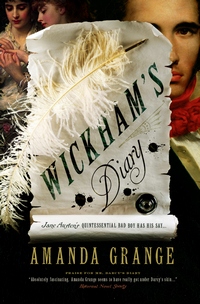 Austen’s bad boy George Wickham gets top billing in this prequel to Pride and Prejudice that will surprise readers for more reasons than one first imagines.
Austen’s bad boy George Wickham gets top billing in this prequel to Pride and Prejudice that will surprise readers for more reasons than one first imagines.
Anyone who has read Jane Austen’s original novel or seen one of the many movie adaptations knows that Wickham is a bad man: a charming rogue, a gamester and an infamous eloper. But what influences molded his character and what forces drove him to his choices? Wickham’s Diary presents some interesting options for us to ponder. Was it nature or nurture that corrupted his soul? After knowing his story, will we be sympathetic, or ready to string him up? Here’s a case study:
Early Childhood:
George is the son of an attorney working as a steward at the grand country estate of Pemberley in Derbyshire. At twelve, he is the companion of the heir Fitzwilliam Darcy. He has everything going for him: good looks, affable manners and a stage mother. On her urgent request, he ingratiates himself
to the family and wins the heart of old Mr. Darcy who sends him to Eton to be educated with his son. He is also promised a future living as a clergyman on the estate. He thinks that the only difference between the respect and admiration that his friend Darcy commands is his money. To attain the wealth, power and social position that he craves, his mother advises him to marry an heiress. Casting his eye on the wealthy young women he knows, Georgiana Darcy and her cousin Anne de Bourgh are his first targets. Calculating and contrived, his life is solely driven to find a rich wife.
Young Adulthood:
He is sent to Cambridge at the expense of Mr. Darcy to be educated as a gentleman. Seeing the advantages of social connections, he continues to search for a rich sister within his fellow classmates. He is not a good student, and soon falls in with the wrong people: drinking, carousing and gambling his way into debt. Fitzwilliam attempts to save him. He promises to reform, but soon slides back. His mother dies. He drinks, gambles and carouses some more. His dreams of marrying an heiress are fading away. No proper mother will let their daughters near him. Old Mr. Darcy dies leaving him the promised living. He and Darcy have a falling out over his lifestyle, loosing his friends good opinion forever. He is in serious debt and asks him to pay him a lump sum, accepting £3,000 instead of the church living. Fitzwilliam washes his hands of him while Wickham squanders his inheritance. We wait to see what forces drive him to later stalk Anne de Bourgh and scheme to elope with Georgiana.
Yes, George Wickham is a despicable scoundrel – and so fun to watch charm, scheme and fail in the original novel. We know that it is unkind to take pleasure from other’s misfortunes, but this is a morality tale that Jane Austen set up, so we give ourselves permission to enjoy it! Amanda Grange’s skill at relaying Wickham’s simple plan for a happy life: marry a rich wife, attain her social position, absorb her estate and spend her money, makes it all seem so logical. Being a male equivalent of a gold digger is very seemly. Especially since Regency men had freedoms that women would never aspire to. Wickham is depraved, he is dissipated and he is disgusting. But we knew that already from Austen’s tale.
We do learn interesting new tidbits that formed his character: a selfish, thoughtless, frivolous mother disappointed in her lot teaches her son to obtain what she wanted out of life by unscrupulous means. This is the root of his evil beginnings. The early childhood scenes with mummy dearest are the most interesting insights in this novella. They were over too quickly. So was the rest of the story. It abruptly ends with the failed elopement at Ramsgate, leaving us dangling mid-air. We felt short sheeted. Just when the story gets rolling it stops. No insights into Wicky’s Meryton escapades: meeting Mr. Darcy again, his flirtation with Elizabeth Bennet, inside dirt on his pursuit of heiress Mary King, what went down in Brighton with Lydia, and why did he really elope with a young, frivolous woman who was as far from an heiress as could be? Why, why, why, kept rolling through my mind. Guess we won’t’ find out.
Being an account of his childhood, his friendship with Fitzwilliam Darcy, and his attempted elopement with Miss Georgian Darcy. Yep, the subtitle pretty much sums it up. So be prepared gentle reader for the short ride, and not all what one might expect from the great Amanda Grange who has wowed us for years with her amazing Austen hero’s diaries series. I am setting my hopes on her next “real” novel, Henry Tilney’s Diary, to be released in the UK in May and the US in December of this year. That thought alone wipes away any deeply harbored regrets hereto.
3 out of 5 Stars
Wickham’s Diary, by Amanda Grange
Sourcebooks (2011)
Trade paperback (208) pages
ISBN: 978-1402251863
Cover image courtesy of Sourcebooks © 2011; text Laurel Ann Nattress © 2011, Austenprose.com
I felt the same way you did, Laurel Ann. I think not seeing what Wickham thought while in Meryton was a missed opportunity. I did like his mother, though, and I thought his pursuit of Anne de Bourgh was interesting. Well-written review, as always!
LikeLike
Thanks Meredith. Maybe the topic will be readdressed in the future in more depth. It was a fun read, but unsatisfying.
LikeLike
My thoughts EXACTLY. Your spot-on review was about as long as half this book. This little paperback looks weird next to her full size hardbacks on my shelf. And my self-diagnosed OCD does not appreciate it. Pffffft.
LikeLike